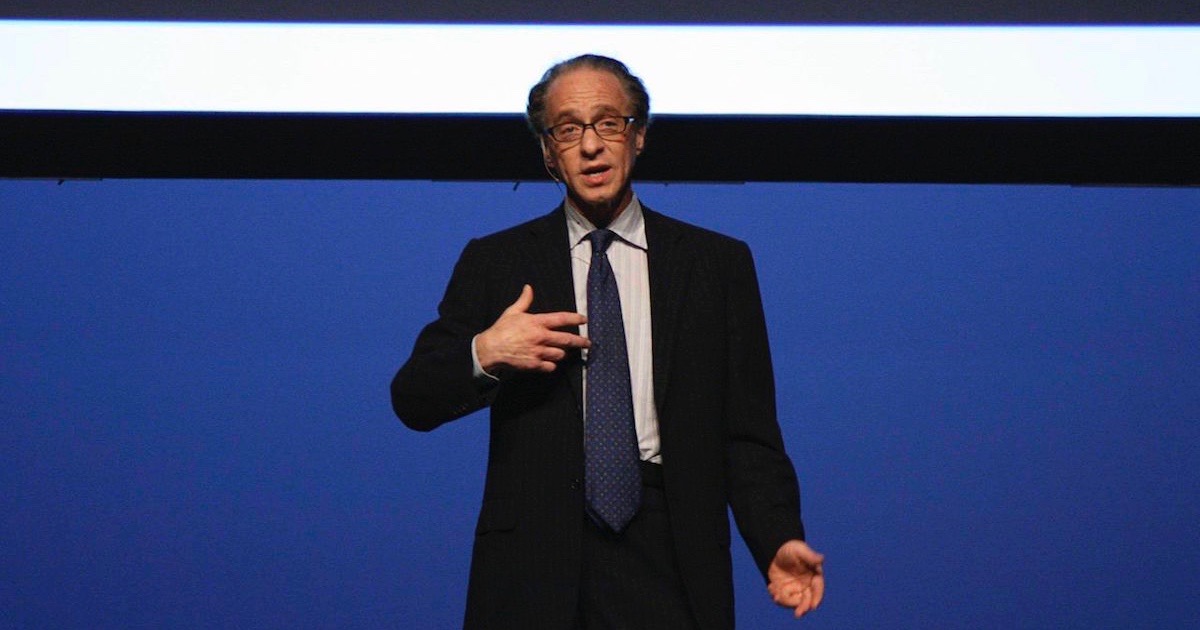 Neuroscience & Mind
Neuroscience & Mind
 News Media
News Media
“Computers in Your Brain”: Ray Kurzweil’s Nightmare AI Vision

I’m trying to count the number of ways that reading Google futurologist Ray Kurzweil as he gushes about the “singularity” makes me feel sick to my stomach.
Technological singularity will turn us into super humans some time in the next 12 years, according to a Google expert.
This might sound like science fiction, but Google’s Director of Engineering, Ray Kurzweil has made 147 predictions since the 1990s and has an 86 per cent success rate.
Kurzweil says when we live in a cybernetic society we will have computers in our brains and machines will be smarter than human beings.
He claims this is already happening with technology — especially with our addiction to our phones — and says the next step is to wire this technology into our brains.
More:
[H]e believes that implanting computers in our brains will improve us.
‘We’re going to get more neocortex, we’re going to be funnier, we’re going to be better at music. We’re going to be sexier’, he said.
‘We’re really going to exemplify all the things that we value in humans to a greater degree.’
Rather than a vision of the future where machines take over humanity, Kurzweil believes we will create a human-machine synthesis which will improve us.
Really? Computers in our brain will “improve us”? Not merely by helping us find more disinformation and other amusements on the Internet, but with “all the things that we value in humans”?
The extracts above are from an online article in the U.K.’s Daily Mail. Down the right side of the article are the usual long series of thumbnail photos and captions that will take you to other offerings from the same newspaper:
“Lena Dunham flaunts her incredible weight loss…” “Braless Bella Thorne flashes her nipple piercing…” “Worse-for-wear Kris Jenner, 61, bares her bra under sheer gold mini before risking flashing entire derriere…”
They put those there, obviously, because left to our own devices — in the literal and figurative senses of the word — that garbage is what males and many females will spend their time clicking on.
He’s right, as we know by now, about the utterly addictive nature of “smart” phones. Add to that all the other screens that dominate our lives. Have you tried wrestling the Xbox away from your 15-year-old lately? And having one in your brain will improve the situation…are you kidding?
Ray Kurzweil is a visionary all right. But the vision is a nightmare.
His is the same mentality that heedlessly wants to hand out addictive technology to school kids whose parents already can’t handle the stuff. The incredible blindness to unintended consequences makes me want to throw up, and so does the fact that Kurzweil is employed in his visionary role by Google, a company whose services we all constantly rely upon.
With our clicks, it’s his dream of the future that we are all daily, hourly helping to pay to advance.
Tom Bethell in Darwin’s House of Cards is great on the underlying philosophy of Artificial Intelligence (AI). He interviewed Stanford’s John McCarthy.
[McCarthy]…allowed that almost all who work on AI are materialists. Everything is assumed to be physical, the mind included. A physical description of the brain can yield a complete account of mental states, he thought.
Bethell, however, pours cold water on high expectations of what AI can actually deliver, anytime soon, or ever. Another visionary, Alan Turing,
…thought in the 1930s that thinking machines could be constructed, and by the end of the twentieth century, he believed, “one will be able to speak of machines thinking without expecting to be contradicted.” In 1950, he devised the Turing test: If someone behind a screen could not distinguish between human and machine responses, the machine could be considered intelligent.
That still hasn’t happened. Bethell points to the towering challenge of coding “common sense,” of the kind we use for daily tasks. Robots can pick up and stack bricks. However, observes John McCarthy, cats are a different matter.
Picking up bricks — yes. “Picking up cats — no.” Robots can’t do that. “Not even dead cats.”
My own vision of the future is that someday people with any common sense will pay to escape computers for a little while. If we can afford it, we’ll send our children to schools where instead of handing out a laptop or tablet, kids will be issued a typewriter to do their homework.
In the future, we’ll better understand the idea of a Sabbath, 24 hours in the week without staring at computer screens. We’ll appreciate the genius of the coffee shop in Burlington, VT, that improved its business by turning off the Wi-Fi and banning laptops. The idea has caught on, according to the BBC.
“People are sick of looking at their phones,” says Joshua Mullenax, a customer who originally came into Kibbitznest [a coffee shop in Chicago’s Lincoln Park] wanting to work on his computer. When he learned it was an internet-free zone, he stayed, saying that he loved the idea, even if he found it a bit impractical.
Ray Kurzweil aside, one day if we’re wise we will seek opportunities not to put computers in our brains, but to turn the damn things off.
Photo: Ray Kurzweill, by Ed Schipul [CC BY-SA 2.0], via Wikimedia Commons.
